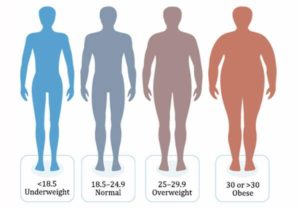Does BMI affect Heart Health?

Cardiovascular ailments are a primary cause of death all across the globe in recent years. Medical surveys and research have shown that such diseases are going to increase steadily in the coming years. Some of the biggest risk factors for cardiovascular ailments include diabetes, obesity, hypertension, use of tobacco, dyslipidemia, etc. The whole world is plagued with issues like overweight, obesity, and diabetes.
What is BMI?
The full form of BMI is body mass index. Many people did not have an idea regarding BMI off late, and hence, they did not know the connection between BMI and heart health. Body mass index is the calculation of body fat of an individual, based on one’s height and weight. The higher the BMI for a person, the greater are the risks of various kinds of heart ailments and cardiovascular diseases. Along with heart problems, a high BMI might be an indication of other health hazards as well like hypertension, stroke, diabetes, etc. when a person has a BMI of 18.5 – 24.9, it is considered to be normal. A BMI in the range between 25 to 29.9 is overweight, and anything that is beyond 30 is obese.
Waist circumference and heart health
Did you have any idea that the circumference of your waist could have an impact on the health of your heart? Medical studies opine that measuring waist circumference helps in screening for possible health risks which are associated with obesity and overweight. When the deposition of the maximum amount of fat is around the waist area and not at the hips, one is at high risk for type 2 diabetes and heart disease. Women who have a waist size of 35 inches or more, and men who have a waist measurement of 40 inches or more significant are at higher risk of heart ailments. It is also important that the measurements are properly taken with tape for avoiding any kinds of mistakes in calculations.
Risk factors associated with obesity, high BMI
There are clear indications of the fact that people who are obese or overweight and have high BMI have high risks of heart diseases and cardiovascular ailments. Some of the other risk factors associated with it include high LDL cholesterol (bad cholesterol), low HDL cholesterol (good cholesterol), high blood pressure (hypertension), high blood glucose levels (sugar levels), high levels of triglycerides, cigarette smoking, family history of heart disease, physical inactivity, etc.
People who are overweight (BMI – 25 to 29.9) or obese (BMI 30 or more than 30) and have two or more numbers of risk factors (mentioned above) should take proper initiatives of losing weight. This is strictly recommended by doctors. Even a minimal amount of weight loss, say only 5-10% of your total body weight, will help in reducing the risks which might lead to serious heart problems and cardiovascular issues. Ailments which are directly associated with obesity can also be combated in this manner.
Also, there are people who are overweight, but who do not have big waist circumference and measurement. They might also have less than two risk factors. In such cases, doctors recommend preventing further weight gain. Losing weight is good, but even if that doesn’t happen, it is okay. But gaining weight further is a strict no-no.
Being a little cautious and careful about one’s weight, waist circumference, and the various risk factors prove to provide better health in the long run, particularly after the age of 40 years.
Effective tips for maintaining a healthy BMI
Maintaining a healthy BMI is not only great for heart health and cardiovascular system but also the overall well-being of an individual. If you have a high BMI and other risk factors, it is important that you take steps for bringing the BMI level down as much as possible. Even a small reduction in BMI reading proves to be good for the body.
Mentioned below are some effective tips for maintaining a healthy BMI:
- Refrain from random binging and snacking – Random snacking is a major contributor to weight gain. Many people have a habit of randomly bringing throughout the day, and this has a reverse effect on the overall health of the individual. Even if you like random snacking, include healthy foods in the same instead of fried stuff and fast foods. Set specific mealtimes for yourself. Also, it is important to control the size of the portions carefully. By following a schedule for eating, you will not feel hungry randomly and your binge eating sprees will be reduced.
- Getting and staying active is important – For maintaining a healthy BMI, it is important to stay active. And for this, there is no better alternative than exercising regularly. For many people exercising is highly repulsive, but it is one of the best ways of keeping a healthy BMI. You will not need to do some kind of exercise which you abhor. Instead, indulge in some kind of sport or outdoor activity which interests you as that is equally beneficial and rewarding in keeping BMI levels down.
- Eating healthy is highly recommended – Many people resort to cutting down on their eating for losing weight. However, in most cases, it has been seen that this crash dieting leads to ill health and other problems. To maintain proper BMI levels, it is important to eat healthy so that the body gets all the nutrients required for proper functioning. Increase intake of fresh green vegetables and fruits and cut down on harmful fats.
It is also recommended to cut down on all kinds of high-calorie drinks or drinks which are high in sugar content. Drink more water and refrain from aerated drinks, soft drinks, and other high-calorie drinks.
People who are obese, overweight, and have other risk factors should get regular health screenings done to understand the current state of the health and current BMI levels.